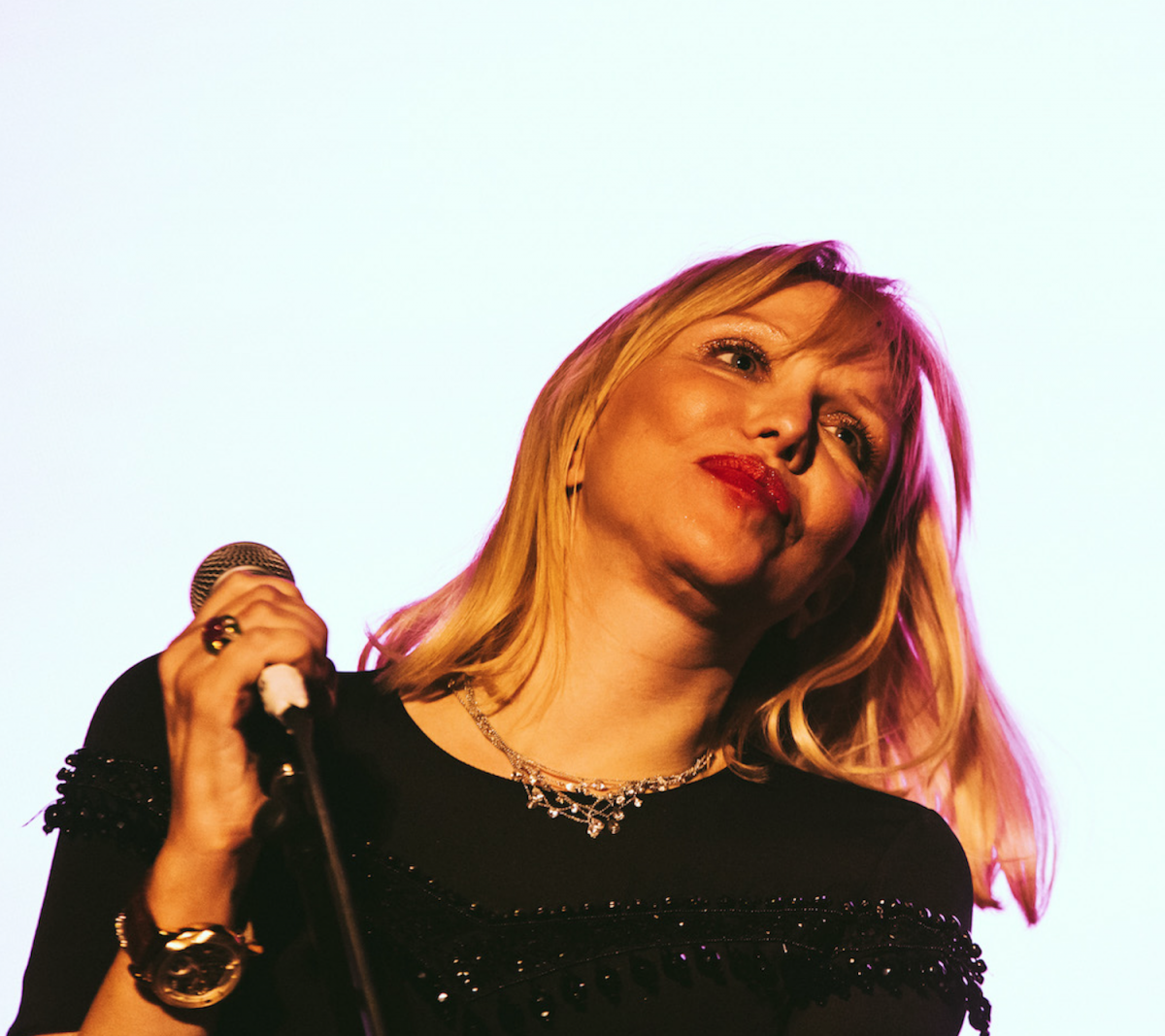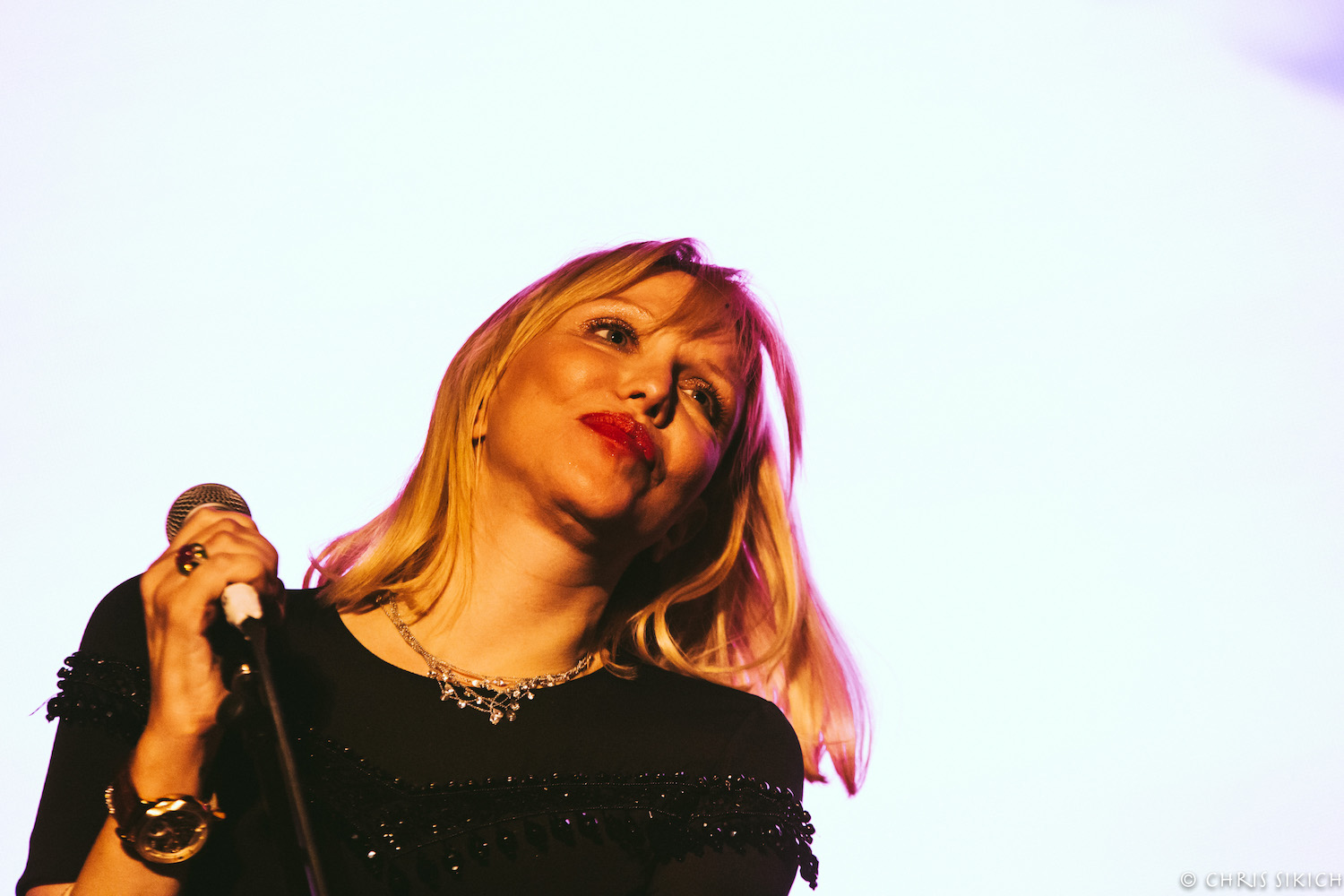
Courtney Love (and a few friends) paid tribute to Courtney Love at Basilica Hudson’s biennial Pioneering People fundraiser in upstate New York. MAGNET’s M.J. Fine (words) and Chris Sikich (photos) traveled to the absolute outskirts of civilization to celebrate “the magic and the power” of Love.
When you’ve broken as many boundaries as Courtney Love has, people eager to pay their respects will drive through flooded roads and wait in massive puddles of dirty water until you’re good and ready to receive them. And when you’ve burned as many bridges as Courtney Love has, people will drop you harder than a crowdsurfer in a pit full of spindly armed selfie queens. Both principles were in play at Hudson, N.Y.’s Basilica Hudson for a sold-out tribute to “the magic and the power” of the rock star/model/actress.
Pioneering People Basilica Benefit: Courtney Love—announced with a snowballing all-star lineup that never quite materialized—was part New York society outing, part amateur hour. It was wildly uneven, significantly disappointing in certain respects and heartwarming in others. In short, it was not the tribute that Courtney Love, the pioneering musician, deserves or the one that fans who’d traveled long distances had come to see. But it was the tribute that Courtney Love, the polarizing person, has in some ways earned and one that made those who will defend her to the end grateful that she and we are all, somehow, still alive.
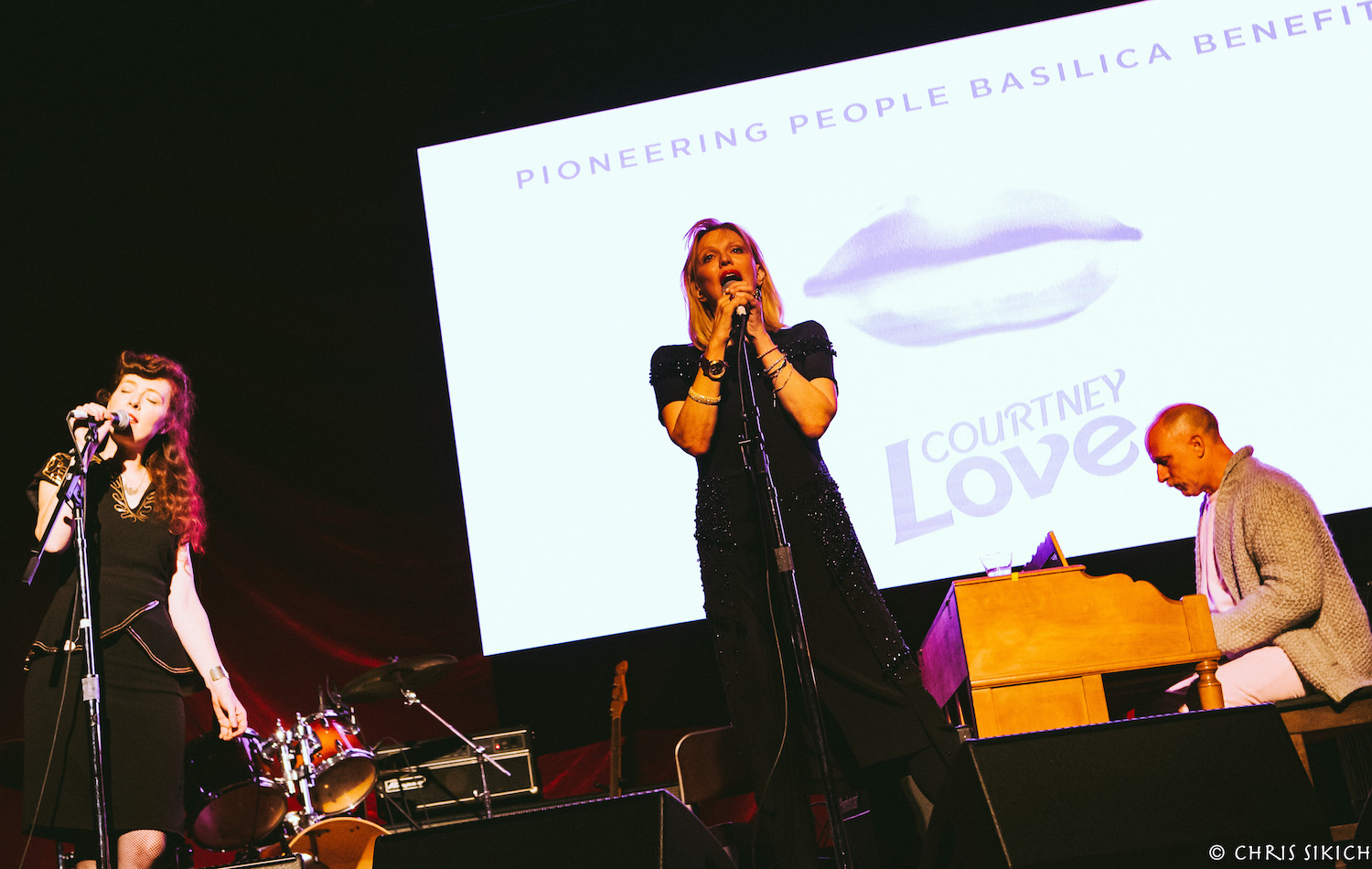
The highlight, unsurprisingly, was Love herself (would she have had it any other way?) performing three songs from Hole’s 1994 tour-de-force Live Through This. For an audience so starved for Love’s presence that they’d trekked out to the absolute outskirts of New York civilization, as one guest put it, it was admittedly fabulous to hear three beloved songs recontextualized. Accompanied by Melissa Auf der Maur (Hole’s former bassist, co-founder and director of Hudson Basilica and de facto hostess for the evening), Love sang an acoustic version of “Softer, Softest” with Imperial Teen’s Roddy Bottum on piano, followed by “Doll Parts” and “Miss World,” which gained an electrical charge from Rebel Girls Rock Academy guitarists who weren’t born until well after Hole disbanded.
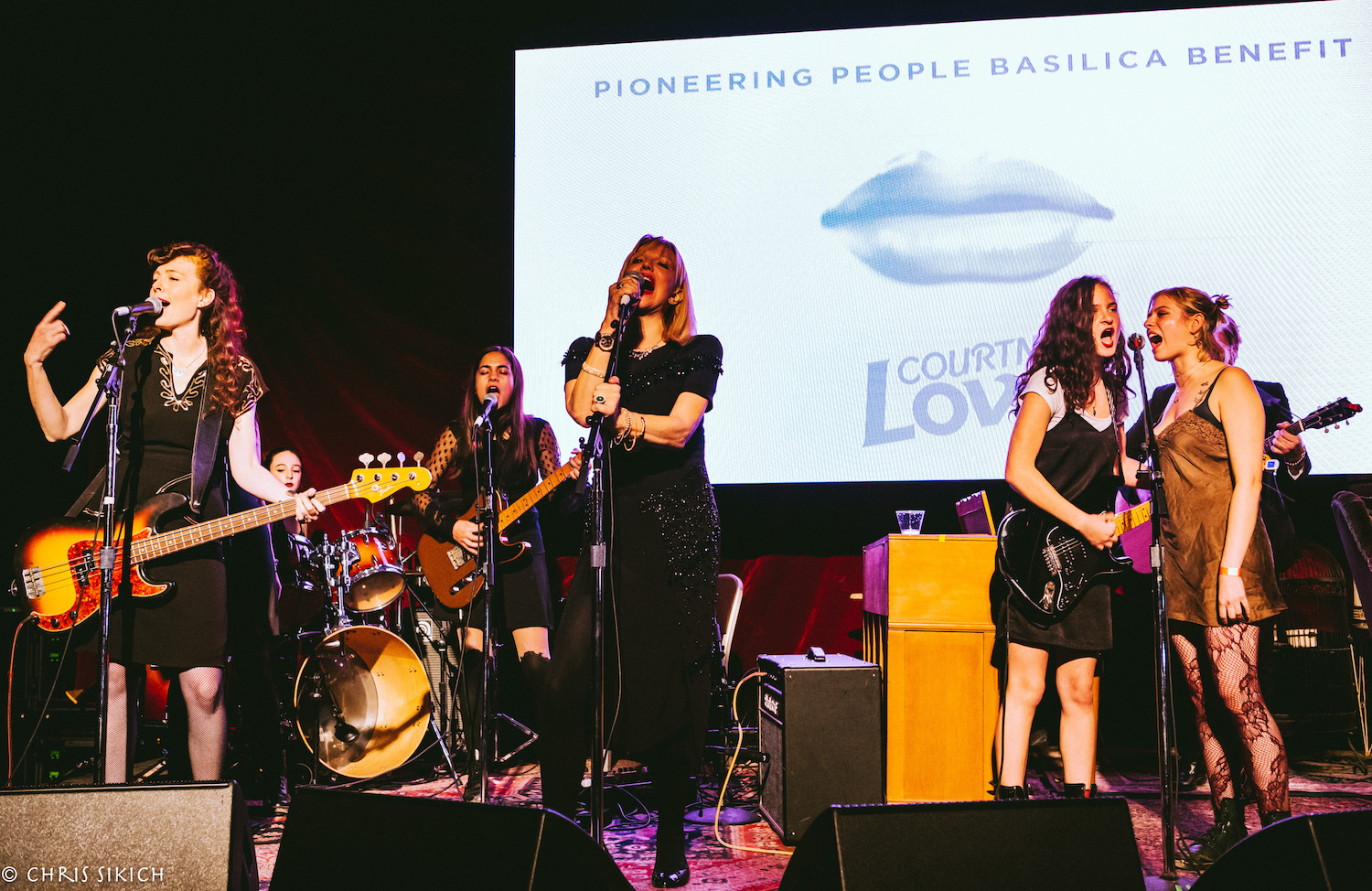
It was a genuinely powerful-sounding, emotional three-song set, and if the teen musicians seemed less than awestruck by the moment, Love is at least partially to credit for making the occasion seem so normal, both by her quiet presence and her early-career bulldozing.
Love’s influence was most clearly articulated by Meredith Graves, the former Perfect Pussy singer/music journalist/new Kickstarter music director, who started playing guitar at 11, shortly after Hole’s epic Celebrity Skin came out in 1998.

Graves recalled the impact of Love’s lyrics, “Doll Parts” in particular, and the way instant adages like “I want to be the girl with the most cake” and “Someday you will ache like I ache” tapped something deep within her and girls like her. Love didn’t just give voice to the pain and anguish so many listeners felt; her underrecognized talent as a songwriter, inextricably coupled with her lightning-rod status as Kurt Cobain’s outspoken girlfriend, wife and widow, helped those who were drawn to her find each other. Life is unfair—whether you’re a millionaire rock star with no secrets or a precocious tween with many—but if you’re lucky, you can create a supportive community out of people who make you feel less alone.
“Twenty years ahead of women in music joining the larger societal discourse around #MeToo, we were writing Hole lyrics on our three-subject notebooks to accomplish the same ends,” Graves said.

While her speech was worthy of its subject, the night’s other tributes were more in the vein of Night Of 1,000 Kates, Philadelphia’s annual camp homage to Kate Bush—but mostly without the same level of ambition and artistic commitment. The best of these was a snarky cabaret rendition of “Old Age” by Justin Vivian Bond and Kenny Mellman. The rest included a tragicomic reading of “Teenage Whore” by Orange Is The New Black star Natasha Lyonne, via video; “Good Sister/Bad Sister,” acted out by multimedia artists Zia Anger and Annie Bielski, complete with black goo and partial nudity; and an interpretive dance and lip-sync to “Violet” by the singularly named enigma Davon, whose chiding of the audience about its overwhelming white privilege felt longer and stronger than his performance.
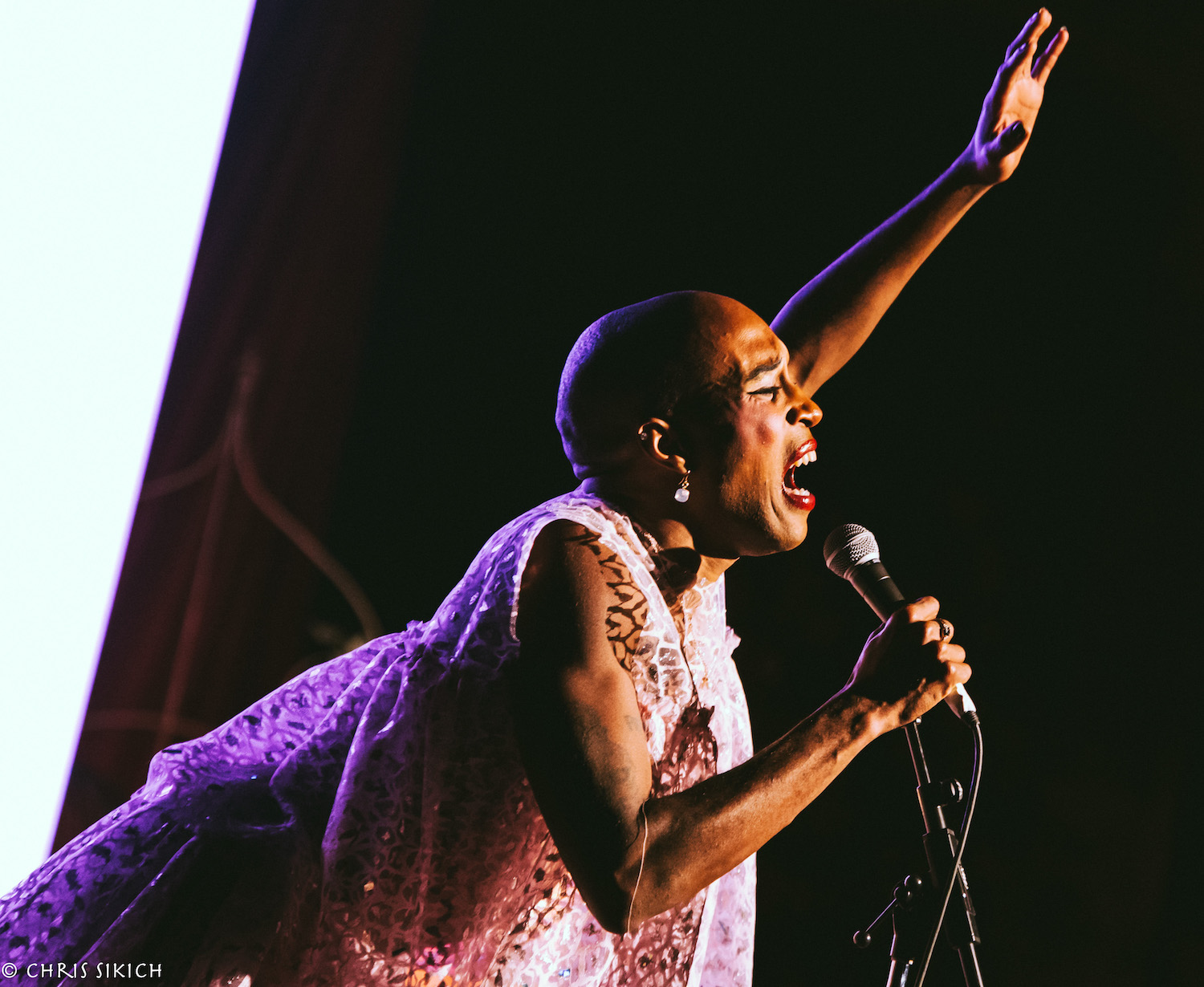
But with cryptic pre-show communication that allowed rumors and speculation to flourish—including hopes that surprise guests like Billy Corgan might play with the night’s honoree; that Michael Stipe, the event’s most notable announced performer, would serenade her with R.E.M.’s “Crush With Eyeliner” or duet on “Doll Parts”; or even that there would be a full-blown Hole reunion—the night left a chunk of the audience disappointed, including some who’d paid three-figure VIP ticket prices for seats that turned out to be much further back than they’d been led to believe.

Stipe beamed in from his sickbed to beg off, matter-of-factly and without abject apology, saying that he had wanted to be there for his friend and goddaughters (including a grown-up Frances Bean Cobain, looking lovely in the front row next to her mom), but instead offered a short snippet of “Doll Parts.” Since he’d been advertised as one of the event’s hosts and was still listed in the program as the top performer aside from Love, it seemed odd that Stipe’s absence wasn’t mentioned until the finale, almost as an aside, and that he said more about feeling sick and missing his friends than about what made Love worth celebrating in the first place. Corgan, whose potential appearance was always more wishful thinking than grounded in fact, was a no-show, as were Chloë Sevigny and others who’d been confirmed, compressing a scheduled three-hour running time into slightly over two hours.

As for Love’s former bandmates, Patty Schemel and Eric Erlandson sent their regards in a “video bouquet” of salutes, which also included Rufus Wainwright, John Waters, performance artist Marina Abramowić, and fashion designers Marc Jacobs and Jeremy Scott. If you showed the montage to someone who was unfamiliar with the guest of honor, they’d never know that she made music, let alone wrote and recorded some of the most piercing songs of her generation, or that she’d had a surprisingly respectable side career as an actress.

Auf der Maur did what she could, as side musician, emcee and interviewer. While her questions were too basic and fawning to elicit anything new from Love, there were a couple good anecdotes, including a one about how she came to know the truth about Harvey Weinstein and one about Fleetwood Mac playing a private show so Hole could study them up close. Auf der Maur’s affection for her former boss was evident, matched only by her cheerleading for the venue itself, a lovingly refurbished factory whose aim is to connect artists and create sustainable community in a rapidly gentrifying area.

But while it was sweet to hear her urge Love to save the world from this precarious time we find ourselves in, and cool to see her candid photos from Hole’s touring days projected on the big screen during the Q&A, the overall effect didn’t inspire much hope. As much as some of us would love to see Love take center stage musically and culturally again, it doesn’t seem any more likely to happen.
In Graves’ speech, she imaged the unfolding moment as “acolytes of Babylon feasting at the feet of our high priestess.” We don’t actually live in a world that recognizes women in their mid-50s as high priestesses, and, to be honest, not much of the music Courtney Love has released this century has been worth feasting on.
With Love seeming more like she was doing a favor for an old friend, and most of her own old friends nowhere to be found, it’s long past time to push past the desire for a heroine or some other savior, and figure out how to build bridges—or rebuild the ones that have been burned down—to create those supportive, sustainable communities already.


